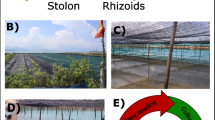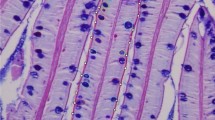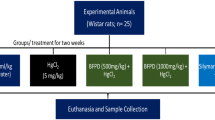Abstract
The major goal of this study was to determine the effect of grape seed extract (GSE) on liver damage in rainbow trout (Oncorhynchus mykiss) that was caused by the consumption of dietary oxidized fish oil (OFO). Rainbow trout were fed six different experimental diets coded OX-GSE 0 (OFO diet), OX-GSE 1 (OFO and 0.1% GSE), OX-GSE 3 (OFO and 0.3% GSE), GSE 0 (fresh fish oil and 0.0% GSE), GSE 1 (fresh fish oil and 0.1% GSE), and GSE 3 (fresh fish oil and 0.3% GSE) for 30 days. The lowest % hepatosomatic index (HSI) result was calculated in fish fed with OX-GSE 0 and the highest HSI was determined in fish fed with GSE 1 diets (p < 0.05). Histopathologically, hydropic degeneration in hepatocytes significantly increased OX-GSE 0 and GSE 3 compared to GSE 1 diets (p < 0.05). Deposition of lipid droplets in hepatocytes was significantly increased in OX-GSE 0 and OX-GSE 3 groups than others (p < 0.05). Liver biochemistry parameters such as superoxide dismutase (SOD), glutathione (GSH), and malondialdehyde (MDA) were significantly affected by OX and GSE treatments (p < 0.05). There were significant differences in alanine aminotransferase (ALT), aspartate aminotransferase (AST), and alkaline phosphatase (ALP) among the liver enzymes analyzed in serum in OX and GSE (p < 0.05), meanwhile no difference was observed in lactate dehydrogenase (LDH) values between groups (p > 0.05). In conclusion, liver biochemistry and histopathology of rainbow trout consuming diets containing oxidized fish oil were negatively affected. However, it was determined that the supplementation of 0.1% GSE to the diet had a significant ameliorative role in these adverse effects.



Similar content being viewed by others
Data availability
Selected data will be made available on request.
References
Acar Ü, Kesbiç OS, Yılmaz S, İnanan BE, Zemheri-Navruz F, Terzi F, Fazio F, Parrino V (2021) Effects of essential oil derived from the bitter orange (Citrus aurantium) on growth performance, histology and gene expression levels in common carp juveniles (Cyprinus carpio). Animals 11(5):1431. https://doi.org/10.3390/ani11051431
Alak G, Ucar A, Parlak V, Yeltekin AÇ, Özgeriş FB, Atamanalp M, Türkez H (2021) Antioxidant potential of ulexite in zebrafish brain: assessment of oxidative DNA damage, apoptosis, and response of antioxidant defense system. Biol Trace Elem Res 199(3):1092–1099. https://doi.org/10.1007/s12011-020-02231-7
Alves VLCD, Rico BPM, Cruz RMS, Vicente AA, Khmelinskii I, Vieira MC (2018) Preparation and characterization of a chitosan film with grape seed extract-carvacrol microcapsules and its effect on the shelf-life of refrigerated Salmon (Salmo salar). LWT 89:525–534. https://doi.org/10.1016/j.lwt.2017.11.013
Arslan G, Sönmez A, Yanık T (2018) Effects of grape Vitis vinifera seed oil supplementation on growth, survival, fatty acid profiles, antioxidant contents and blood parameters in rainbow trout Oncorhynchus mykiss. Aquac Res 49(6):2256–2266. https://doi.org/10.1111/are.13686
Birben E, Sahiner UM, Sackesen C, Erzurum S, Kalayci O (2012) Oxidative stress and antioxidant defense. World Allergy Organ J 5(1):9–19. https://doi.org/10.1097/WOX.0b013e3182439613
Chedea VS, Braicu C, Socaciu C (2010) Antioxidant/prooxidant activity of a polyphenolic grape seed extract. Food Chem 121(1):132–139. https://doi.org/10.1016/j.foodchem.2009.12.020
Chen YJ, Liu YJ, Yang HJ, Yuan Y, Liu FJ, Tian LX, Liang GY, Yuan RM (2012) Effect of dietary oxidized fish oil on growth performance, body composition, antioxidant defence mechanism and liver histology of juvenile largemouth bass Micropterus salmoides. Aquac Nutr 18(3):321–331. https://doi.org/10.1111/j.1365-2095.2011.00900.x
Chen Y-J, Liu Y-J, Tian L-X, Niu J, Liang G-Y, Yang H-J, Yuan Y, Zhang Y-Q (2013) Effect of dietary vitamin E and selenium supplementation on growth, body composition, and antioxidant defense mechanism in juvenile largemouth bass (Micropterus salmoide) fed oxidized fish oil. Fish Physiol Biochem 39(3):593–604
Chen X, Wang Q, Guo Z, Zhao Y, Gao Y, Yu T, Chen Y, Zhang D, Wang G (2019) Effects of dietary oxidized fish oil on growth performance and antioxidant defense mechanism of juvenile Rhynchocypris lagowski Dybowski. Aquaculture 512:734368. https://doi.org/10.1016/j.aquaculture.2019.734368
Cunniff P, Washington D (1997) Official methods of analysis of aoac international. J AOAC Int 80(6):127A
Delany JP, Windhauser MM, Champagne CM, Bray GA (2000) Differential oxidation of individual dietary fatty acids in humans. Am J Clin Nutr 72(4):905–911. https://doi.org/10.1093/ajcn/72.4.905
Demirci B, Terzi F, Kesbic OS, Acar U, Yilmaz S, Kesbic FI (2021) Does dietary incorporation level of pea protein isolate influence the digestive system morphology in rainbow trout (Oncorhynchus mykiss)? Anat Histol Embryol 50(6):956–964. https://doi.org/10.1111/ahe.12740
Dong G, Huang F, Zhu X, Zhang L, Mei M, Hu Q, Liu H (2012) Nutriphysiological and cytological responses of juvenile channel catfish (I ctalurus punctatus) to dietary oxidized fish oil. Aquac Nutr 18(6):673–684. https://doi.org/10.1111/j.1365-2095.2011.00931.x
Elbialy ZI, Rizk M, Al-Hawary II, Salah AS, Mohammed RA, Assar DH, Almeer R, Dawood MA (2021) Yucca schidigera extract mediated the growth performance, hepato-renal function, antioxidative status and histopathological alterations in Nile tilapia (Oreochromis niloticus) exposed to hypoxia stress. Aquac Res 52(5):1965–1976. https://doi.org/10.1111/are.15045
Figueiredo-Silva A, Rocha E, Dias J, Silva P, Rema P, Gomes E, Valente L (2005) Partial replacement of fish oil by soybean oil on lipid distribution and liver histology in European sea bass (Dicentrarchus labrax) and rainbow trout (Oncorhynchus mykiss) juveniles. Aquac Nutr 11(2):147–155
Fontagné S, Lataillade E, Brèque J, Kaushik S (2008) Lipid peroxidative stress and antioxidant defence status during ontogeny of rainbow trout (Oncorhynchus mykiss). Br J Nutr 100(1):102–111. https://doi.org/10.1017/S0007114507876215
Gabetta B, Fuzzati N, Griffini A, Lolla E, Pace R, Ruffilli T, Peterlongo F (2000) Characterization of proanthocyanidins from grape seeds. Fitoterapia 71(2):162–175. https://doi.org/10.1016/S0367-326X(99)00161-6
Gao J, Koshio S, Ishikawa M, Yokoyama S, Mamauag REP, Han Y (2012) Effects of dietary oxidized fish oil with vitamin E supplementation on growth performance and reduction of lipid peroxidation in tissues and blood of red sea bream Pagrus major. Aquaculture 356–357:73–79. https://doi.org/10.1016/j.aquaculture.2012.05.034
Gao J, Koshio S, Ishikawa M, Yokoyama S, Nguyen B, Mamauag R (2013) Effect of dietary oxidized fish oil and vitamin C supplementation on growth performance and reduction of oxidative stress in Red Sea Bream Pagrus major. Aquac Nutr 19(1):35–44. https://doi.org/10.1111/j.1365-2095.2011.00921.x
Gęgotek A, Skrzydlewska E (2019) Biological effect of protein modifications by lipid peroxidation products. Chem Phys Lipid 221:46–52. https://doi.org/10.1016/j.chemphyslip.2019.03.011
Gowda S, Desai PB, Hull VV, Avinash AK, Vernekar SN, Kulkarni SS (2009) A review on laboratory liver function tests. The Pan african medical journal 3.
Grosell M, O’donnell M, Wood C, (2000) Hepatic versus gallbladder bile composition: in vivo transport physiology of the gallbladder in rainbow trout. Am J Physiol-Regulatory, Integrative and Comparative Physiology 278(6):R1674–R1684
Hall P, Cash J (2012) What is the real function of the liver ‘function’tests? Ulst Med J 81(1):30
Hamre K, Kolås K, Sandnes K, Julshamn K, Kiessling A (2001) Feed intake and absorption of lipid oxidation products in Atlantic salmon (Salmo salar) fed diets coated with oxidised fish oil. Fish Physiol Biochem 25(3):209–219
Hsieh R, Kinsella J (1989) Oxidation of polyunsaturated fatty acids: mechanisms, products, and inhibition with emphasis on fish. Adv Food Nutr Res 33:233–341. https://doi.org/10.1016/S1043-4526(08)60129-1
Htun-Han M (1978) The reproductive biology of the dab Limanda limanda (L) in the North Sea: gonosomatic index, hepatosomatic index and condition factor. J fish Biol 13(3):369–378
Kesbiç OS, Yigit M (2019) Structural and chemical changes of grape seed extract after thermal processing and its use in rainbow trout (Oncorhynchus mykiss) diets as an organic feed supplement. Aquaculture 503:275–281. https://doi.org/10.1016/j.aquaculture.2019.01.021
Kitts DD, Chen X-M, Jing H (2012) Demonstration of antioxidant and anti-inflammatory bioactivities from sugar–amino acid Maillard reaction products. J Agric Food Chem 60(27):6718–6727. https://doi.org/10.1021/jf2044636
Kop A, Gamsız K, Korkut AY, Sayğı H (2019) The effects of different storage temperatures and durations on peroxide values of fish feed ingredients. Turk J Agri-Food Sci Technol 7(3):43–49. https://doi.org/10.24925/turjaf.v7isp3.43-49.3154
Korkut AY, Kop A, Demir P (2007) Balık Yemlerinde Kullanılan Balık Yağı ve Özellikleri. Su Ürünleri Dergisi 24(1):195–199
Labuza TP, Dugan L Jr (1971) Kinetics of lipid oxidation in foods. Crit Rev Food Sci Nutr 2(3):355–405. https://doi.org/10.1080/10408397109527127
Laohabanjong R, Tantikitti C, Benjakul S, Supamattaya K, Boonyaratpalin M (2009) Lipid oxidation in fish meal stored under different conditions on growth, feed efficiency and hepatopancreatic cells of black tiger shrimp (Penaeus monodon). Aquaculture 286(3):283–289. https://doi.org/10.1016/j.aquaculture.2008.09.038
Lewis-Mccrea LM, Lall SP (2007) Effects of moderately oxidized dietary lipid and the role of vitamin E on the development of skeletal abnormalities in juvenile Atlantic halibut (Hippoglossus hippoglossus). Aquaculture 262(1):142–155. https://doi.org/10.1016/j.aquaculture.2006.09.024
Liao Z, Sun B, Zhang Q, Jia L, Wei Y, Liang M, Xu H (2020) Dietary bile acids regulate the hepatic lipid homeostasis in tiger puffer fed normal or high-lipid diets. Aquaculture 519:734935. https://doi.org/10.1016/j.aquaculture.2020.734935
Long S, Dong X, Tan B, Zhang S, Xie S, Yang Q, Chi S, Liu H, Deng J, Yang Y (2021) Growth performance, antioxidant ability, biochemical index in serum, liver histology and hepatic metabolomics analysis of juvenile hybrid grouper (♀ Epinephelus fuscoguttatus×♂ Epinephelus lanceolatus) fed with oxidized fish oil. Aquaculture 545; 737261. https://doi.org/10.1016/j.aquaculture.2021.737261
Mehrinakhi Z, Ahmadifar E, Sheikhzadeh N, Moghadam MS, Dawood MA (2021) Extract of grape seed enhances the growth performance, humoral and mucosal immunity, and resistance of common carp (Cyprinus carpio) against Aeromonas hydrophila. Annal Animal Sci 21(1):217–232. https://doi.org/10.2478/aoas-2020-0049
Meng Y, Qian K, Ma R, Liu X, Han B, Wu J, Zhang L, Zhan T, Hu X, Tian H, Li C (2019) Effects of dietary lipid levels on sub-adult triploid rainbow trout (Oncorhynchus mykiss): 1 Growth performance, digestive ability, health status and expression of growth-related genes. Aquaculture 513:734394. https://doi.org/10.1016/j.aquaculture.2019.734394
Misra S, Niyogi S (2009) Selenite causes cytotoxicity in rainbow trout (Oncorhynchus mykiss) hepatocytes by inducing oxidative stress. Toxicol in Vitro 23(7):1249–1258. https://doi.org/10.1016/j.tiv.2009.07.031
Mohammadi Y, Bahrami Kamangar B, Zarei MA (2021) Effects of diets containing grape seed proanthocyanidin extract on the growth and oxidative capacity of common carp (Cyprinus carpio). Aquaculture 540:736689. https://doi.org/10.1016/j.aquaculture.2021.736689
Mostafavi ZS, Shekarabi SPH, Mehrgan MS, Islami HR (2022) Amelioration of growth performance, physio-metabolic responses, and antioxidant defense system in rainbow trout, Oncorhynchus mykiss, using dietary dandelion, Taraxacum officinale, flower extract. Aquaculture 546:737296. https://doi.org/10.1016/j.aquaculture.2021.737296
Mousavi S, Sheikhzadeh N, Tayefi-Nasrabadi H, Alizadeh-Salteh S, Khani Oushani A, Firouzamandi M, Mardani K (2020) Administration of grape (Vitis vinifera) seed extract to rainbow trout (Oncorhynchus mykiss) modulates growth performance, some biochemical parameters, and antioxidant-relevant gene expression. Fish Physiol Biochem 46(3):777–786. https://doi.org/10.1007/s10695-019-00716-4
Neiffer DL, Stamper MA (2009) Fish sedation, anesthesia, analgesia, and euthanasia: considerations, methods, and types of drugs. ILAR J 50(4):343–360. https://doi.org/10.1093/ilar.50.4.343
Ohkawa H, Ohishi N, Yagi K (1979) Assay for lipid peroxides in animal tissues by thiobarbituric acid reaction. Anal Biochem 95(2):351–358. https://doi.org/10.1016/0003-2697(79)90738-3
Ojeu, 2003. Regulation (EC) No 1831/2003 of the European Parliament and the Council of 22 September 2003 on additives for use in animal nutrition. Official Journal of European Union, .
Ojeu, 2022. Regulation (EC) No 2022/1375 of the European Parliament and the Council of 08 August 2022 concerning the denial of authorisation of ethoxyquin as a feed additive belonging to the functional group of antioxidants and repealing Implementing Regulation. Official Journal of European Union.
Oliva-Teles A, Enes P, Couto A, Peres H (2022) Replacing fish meal and fish oil in industrial fish feeds. Feed and Feeding Practices in Aquaculture; 231–268. https://doi.org/10.1016/B978-0-12-821598-2.00011-4
Öz M, Yavuz O, Bolukbas F (2020) Histopathology changes in the rainbow trout (Onchorhyncus mykiss) consuming boric acid supplemented fish fodder. J Trace Elem Med Biol 62:126581. https://doi.org/10.1016/j.jtemb.2020.126581
Pasqua G, Simonetti G, Rodriguez J, Franco Ruiz D (2016) Antimicrobial and antiviral activities of grape seed extracts. Grape Seeds; Nova Science Publishers: New York, NY, USA; 211–224.
Peng X, Li F, Lin S, Chen Y (2016) Effects of total replacement of fish oil on growth performance, lipid metabolism and antioxidant capacity in tilapia (Oreochromis niloticus). Aquacult Int 24(1):145–156. https://doi.org/10.1007/s10499-015-9914-7
Perumalla A, Hettiarachchy NS (2011) Green tea and grape seed extracts—potential applications in food safety and quality. Food Res Int 44(4):827–839. https://doi.org/10.1016/j.foodres.2011.01.022
Priyadarshi R, Kim S-M, Rhim J-W (2021) Carboxymethyl cellulose-based multifunctional film combined with zinc oxide nanoparticles and grape seed extract for the preservation of high-fat meat products. Sustain Mater Technol 29:00325. https://doi.org/10.1016/j.susmat.2021.e00325
Rice-Evans C (2001) Flavonoid antioxidants. Curr Med Chem 8(7):797–807. https://doi.org/10.2174/0929867013373011
Sargent J, Bell J, Bell M, Henderson R, Tocher D (1995) Requirement criteria for essential fatty acids. J Appl Ichthyol 11(3/4):183–198. https://doi.org/10.1111/j.1439-0426.1995.tb00018.x
Sedlak J, Lindsay RH (1968) Estimation of total, protein-bound, and nonprotein sulfhydryl groups in tissue with Ellman’s reagent. Anal Biochem 25:192–205
Shao Z-H, Vanden Hoek TL, Xie J, Wojcik K, Chan KC, Li C-Q, Hamann K, Qin Y, Schumacker PT, Becker LB, Yuan C-S (2003) Grape seed proanthocyanidins induce pro-oxidant toxicity in cardiomyocytes. Cardiovasc Toxicol 3(4):331–339. https://doi.org/10.1385/CT:3:4:331
Shekarabi SPH, Mehrgan MS, Ramezani F, Dawood MA, Van Doan H, Moonmanee T, Hamid NKA, Kari ZA (2022) Effect of dietary barberry fruit (Berberis vulgaris) extract on immune function, antioxidant capacity, antibacterial activity, and stress-related gene expression of Siberian sturgeon (Acipenser baerii). Aquaculture Rep 23:101041
Shi Y, Hu Y, Wang Z, Zhou J, Zhang J, Zhong H, Fu G, Zhong L (2021) The protective effect of taurine on oxidized fish-oil-induced liver oxidative stress and intestinal barrier-function impairment in juvenile Ictalurus punctatus. Antioxidants 10(11):1690. https://doi.org/10.3390/antiox10111690
Staessen TW, Verdegem MC, Nederlof MA, Eding EH, Schrama JW (2021) Effect of type of dietary non-protein energy source (starch vs fat) on the body bile acid pool size and composition, faecal bile acid loss and bile acid synthesis in rainbow trout (Oncorhynchus mykiss). Aquaculture Nutri 27(3):865–879
Sun Y, Oberley LW, Li Y (1988) A simple method for clinical assay of superoxide dismutase. Clin Chem 34(3):497–500. https://doi.org/10.1093/clinchem/34.3.497
Teimouri M, Yeganeh S, Mianji GR, Najafi M, Mahjoub S (2019) The effect of Spirulina platensis meal on antioxidant gene expression, total antioxidant capacity, and lipid peroxidation of rainbow trout (Oncorhynchus mykiss). Fish Physiol Biochem 45(3):977–986. https://doi.org/10.1007/s10695-019-0608-3
Thawonsuwan J, Kiron V, Satoh S, Panigrahi A, Verlhac V (2010) Epigallocatechin-3-gallate (EGCG) affects the antioxidant and immune defense of the rainbow trout. Oncorhynchus Mykiss Fish Physiol Biochem 36(3):687–697. https://doi.org/10.1007/s10695-009-9344-4
Turner R, Mclean CH, Silvers KM (2006) Are the health benefits of fish oils limited by products of oxidation? Nutr Res Rev 19(1):53–62. https://doi.org/10.1079/NRR2006117
Vutukuru SS, Chintada S, Radha Madhavi K, Venkateswara Rao J, Anjaneyulu Y (2006) Acute effects of copper on superoxide dismutase, catalase and lipid peroxidation in the freshwater teleost fish. Esomus Danricus Fish Physiol Biochem 32(3):221–229. https://doi.org/10.1007/s10695-006-9004-x
Xie S, Yin P, Tian L, Liu Y, Niu J (2020) Lipid metabolism and plasma metabolomics of juvenile largemouth bass Micropterus salmoides were affected by dietary oxidized fish oil. Aquaculture 522:735158. https://doi.org/10.1016/j.aquaculture.2020.735158
Yang SP, Liu HL, Wang CG, Yang P, Sun CB, Chan SM (2015) Effect of oxidized fish oil on growth performance and oxidative stress of L itopenaeus vannamei. Aquac Nutr 21(1):121–127. https://doi.org/10.1111/anu.12143
Yılmaz S, Acar Ü, Kesbiç OS, Gültepe N, Ergün S (2015) Effects of dietary allspice, Pimenta dioica powder on physiological responses of Oreochromis mossambicus under low pH stress. Springerplus 4(1):1–9. https://doi.org/10.1186/s40064-015-1520-7
Yin P, Xie S, Huo Y, Guo T, Fang H, Zhang Y, Liu Y, Tian L, Niu J (2019) Effects of dietary oxidized fish oil on growth performance, antioxidant defense system, apoptosis and mitochondrial function of juvenile largemouth bass (Micropterus salmoides). Aquaculture 500:347–358. https://doi.org/10.1016/j.aquaculture.2018.09.009
Yu H, Ren Y, Wei H, Xing W, Xu G, Li T, Xue M, Luo L (2022) Dietary oxidized fish oil negatively affected the feed utilization, health status and fillet quality of juvenile Amur sturgeon. A schrenckii. Aquaculture 546:737290. https://doi.org/10.1016/j.aquaculture.2021.737290
Yuan Y, Chen Y, Liu Y, Yang H, Liang G, Tian L (2014) Dietary high level of vitamin premix can eliminate oxidized fish oil–induced oxidative damage and loss of reducing capacity in juvenile largemouth bass (M icropterus salmoides). Aquac Nutr 20(2):109–117. https://doi.org/10.1111/anu.12057
Zhai S-W, Lu J-J, Chen X-H (2014) Effects of dietary grape seed proanthocyanidins on growth performance, some serum biochemical parameters and body composition of tilapia (Oreochromis niloticus) fingerlings. Ital J Anim Sci 13(3):3357. https://doi.org/10.4081/ijas.2014.3357
Zhang Y, Li Y, Liang X, Cao X, Huang L, Yan J, Wei Y, Gao J (2017) Hepatic transcriptome analysis and identification of differentially expressed genes response to dietary oxidized fish oil in loach Misgurnus anguillicaudatus. PLoS One 12(2):0172386. https://doi.org/10.1371/journal.pone.0172386
Zhang D-G, Zhao T, Hogstrand C, Ye H-M, Xu X-J, Luo Z (2021) Oxidized fish oils increased lipid deposition via oxidative stress-mediated mitochondrial dysfunction and the CREB1-Bcl2-Beclin1 pathway in the liver tissues and hepatocytes of yellow catfish. Food Chemistry 360:129814. https://doi.org/10.1016/j.foodchem.2021.129814
Acknowledgements
The authors would like to thank to Kastamonu University Central Research Laboratuvary for supporting about sample storage.
Funding
The histopathologic sections in this project were prepared with a microtome provided by the infrastructure project to the Kastamonu University Scientific Research Projects (Project No: KÜ-BAP05/2021–1).
Author information
Authors and Affiliations
Contributions
All authors participated in the study’s design, interpretation of the findings and analysis of the data, and review of the manuscript. Osman Sabri Kesbic and Ümit Acar prepared oxidized fish oil and experimental ration. Funda Terzi, Osman Sabri Kesbiç, Huseyin Serkan Erol, Beste Demirci, and Süleyman Yıldırım carried out the animal experiments. Funda Terzi performed the histopathological analysis; Beste Demirci performed morphometric measurement; Huseyin Serkan Erol and Çağatay Salum carried out the biochemical analysis. All authors read and approved the final version of the manuscript.
Ethics declarations
Ethical approval
All animal experiments were approved by carried out by European Union Directive no: 2010/63 and the Local Ethics Committee of Kastamonu University (approval no: 2020/32(2200086733)). The animals were handled and used based on the international laboratory animal care and use guidelines. Furthermore, the study was conducted in agreement with the ARRIVE guidelines.
Consent for publication and consent to participate
Not applicable.
Competing interests
The authors declare no competing interests.
Additional information
Publisher's note
Springer Nature remains neutral with regard to jurisdictional claims in published maps and institutional affiliations.
Rights and permissions
Springer Nature or its licensor (e.g. a society or other partner) holds exclusive rights to this article under a publishing agreement with the author(s) or other rightsholder(s); author self-archiving of the accepted manuscript version of this article is solely governed by the terms of such publishing agreement and applicable law.
About this article
Cite this article
Terzi, F., Demirci, B., Acar, Ü. et al. Dietary effect of grape (Vitis vinifera) seed extract mitigates hepatic disorders caused by oxidized fish oil in rainbow trout (Oncorhynchus mykiss). Fish Physiol Biochem 49, 441–454 (2023). https://doi.org/10.1007/s10695-023-01193-6
Received:
Accepted:
Published:
Issue Date:
DOI: https://doi.org/10.1007/s10695-023-01193-6




